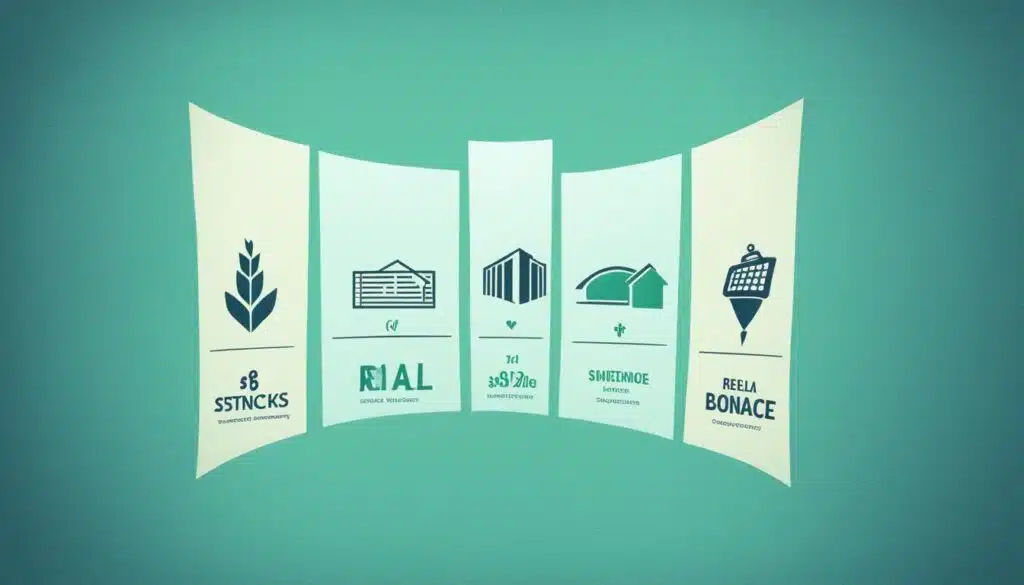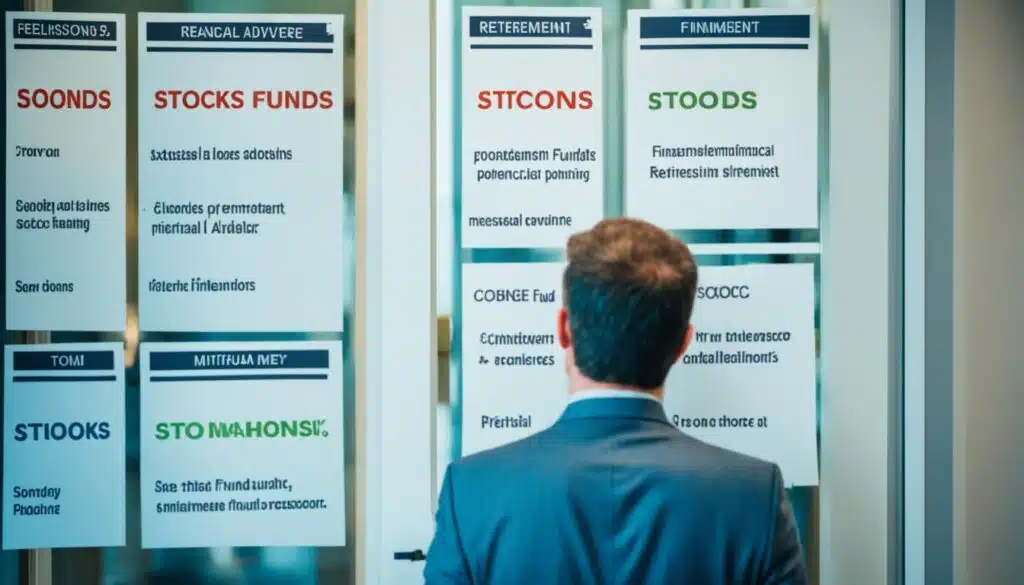Financial Advisor Understanding how to pick a financial adviser can feel overwhelming. However, it’s vital to ensure you get top-notch service for your money. This guide will help you understand how to select the perfect adviser in the UK. When looking for a financial adviser, it’s critical to check their credentials, costs, skills, and methods. Choosing the best adviser is essential for meeting your financial targets and steering clear of costly errors.
Key Takeaways: Financial Advisor
- Qualifications and expertise of the financial adviser are crucial
- Fees and charges must be transparent and aligned with your needs
- Choose an adviser whose approach and values match your own
- Understand the difference between independent and restricted advisers
- Ask the right questions to find the best fit for your financial situation
Introduction
Having the right financial adviser on your side is crucial. They guide you through tricky financial products. A good adviser helps tailor your investments to meet your goals. They make sure you’re moving towards your financial dreams. On the flip side, a wrong adviser might steer you into costly errors.
Recently, more people are seeking financial help. Enquiries for advisers surged by 34% in the past year. This was mainly for advice on pensions, retiring, and investments. It highlights why picking the right adviser is so important for your money matters.
Benefits of Working with a Financial Adviser
- Gain access to expert knowledge and insights on a wide range of financial products and services
- Develop a comprehensive financial plan tailored to your specific goals and risk tolerance
- Receive guidance on complex financial decisions, such as retirement planning and investment strategies
- Benefit from a professional’s objectivity and experience, helping you avoid costly mistakes
- Enjoy peace of mind knowing your financial affairs are being managed by a qualified professional
The cost of financial advice might make you worry, but the value is undeniable. A skilled adviser can vastly improve your financial situation. They increase your chances of reaching your money goals.
“A good financial adviser can help you navigate the complex world of personal finance and make informed decisions about your money. They can provide valuable guidance and support in achieving your financial objectives.”
Also Read : The Ultimate Guide To Financial Planning For Retirement
What to Look for When Choosing a Financial Adviser

Finding the right financial adviser is crucial for your money’s health. It’s important to look at their qualifications, fees, and what they believe in. This helps you pick someone who meets your needs.
Qualifications and Expertise
First, check their qualifications and how much they know. A top adviser must have certifications like Certified Financial Planner. They should be skilled in areas important to you, such as planning for retirement or managing investments.
Fees and Charges
It’s key to understand how they charge for their services. Some advisers take a percentage of your assets, others have set fees, and some charge by the hour. Make sure the services match what you’re paying for.
Approach and Values Alignment
Look for an adviser who thinks like you do. This includes how they invest your money, their way of communicating, and what they care about most. They should focus on your financial dreams and help you reach them by sticking to your values.
Considering these aspects carefully will help you find the right adviser. They should help you with smart financial choices that back your long-term goals.
Types of Financial Advisers

In the United Kingdom, there are several types of financial advisers. Knowing these differences is essential. It helps in making a smart choice when you need professional advice for money matters.
Independent Financial Advisers (IFAs)
IFAs, or Independent Financial Advisers, can guide you on all kinds of financial help. They are not linked to specific companies or products. So, they can give advice that truly fits your needs. IFAs must always put your interests first, making sure their recommendations are honest and unbiased.
Restricted Advisers
On the other hand, restricted advisers can only suggest products from few providers. This limits the scope of their advice. They might focus on specific areas like mortgages. But, their advice depends on the companies they work with.
Choosing an IFA is the better option when looking for a financial adviser. They provide advice from a vast market, suiting your unique financial goals. This is unlike restricted advisers who limit your choices to what their companies offer.
“The key difference between an IFA and a restricted adviser is the breadth of their offering. IFAs can recommend any suitable product from across the entire financial market, while restricted advisers are limited to certain providers or product types.”
Learning about the various financial advisers can help you pick the right one. This is crucial when you need help with financial planning and investing.
Also Read : How To Save Money On Taxes?
Understanding Financial Adviser Fees

Choosing the right financial adviser means knowing how they charge. There are three main ways advisers set their fees: by a percentage, with a fixed amount, or an hourly rate. Each method has its own benefits and things to think about.
Percentage-Based Fees
A common way for advisers to charge is a percentage of the money they handle for you. This could be between 0.5% to 3.2% of your assets, with the usual rate at about 0.77%. This system links the adviser’s earnings to how well your investments do.
Fixed Fees
In contrast, some advisers prefer a fixed fee. Here they set a clear amount you’ll pay for their services. Clients who like to know exactly what they’re spending might choose this option. Fixed fees for advice or planning can be anywhere from £300 to over £500, depending on what’s needed.
Hourly Rates
Financial advisers might also charge by the hour. They set a rate for every hour they spend advising you. Hourly charges usually range from £75 to £300, averaging at about £198 hourly. This method suits clients who only need advice occasionally or for specific tasks.
Knowing the adviser’s fee structure is key to picking the right one for you. It’s important to see how their fees match your financial strategy and what you’re comfortable with. Understanding these fee options helps you choose wisely and get good value for their services.
| Fee Structure | Typical Range | Average |
|---|---|---|
| Percentage-Based Fees | 0.5% to 3.2% | 0.77% |
| Fixed Fees (One-Off Advice) | £300 to £500+ | N/A |
| Hourly Rates | £75 to £300 | £198 |
“Understanding the fee structure of a financial adviser is crucial in ensuring you receive value for money and that their interests are aligned with your own financial goals.”
Also Read : Best Ways To Save Money On A Wedding?
Financial Adviser

Financial advisers help people and families reach their money goals. They can guide you if you’re saving for retirement, investing money, or dealing with a large sum. A good adviser offers expert advice just for you.
They look at your life, how much risk you can handle and what you want in the future. Then, they make a plan especially for you. Their help covers investing, tax, planning your estate, and choosing the right insurance.
If dealing with money alone seems tough, advisers can make things easier. They help you make smart choices and grow your money. This way, you can reach your dreams with more safety and certainty.
Key Responsibilities of a Financial Adviser
- Understanding all aspects of your money situation, such as what you own, what you owe, what you earn, and what you spend
- Setting clear money goals for now and the future, like saving for when you stop working, managing debts, or making wealth
- Creating a money plan that suggests ways to meet your goals and make your money work better for you
- Staying connected to update the plan as your life changes or when the market does
- Helping you pick from different money tools, like where to invest, which insurance to get, which loans to take, and how to plan for taxes
- Checking the plan regularly and making changes to keep up with your new goals or shifts in the financial world
No matter your financial situation, working with a financial adviser can give you peace of mind. You’ll get help to make wise decisions for a more stable financial tomorrow.
“A good financial adviser can be the key to unlocking your financial potential and achieving your long-term goals.”
Also Read : Best Ways To Invest Money For Beginners?
Factors to Consider When Selecting a Financial Adviser

There are several crucial factors when picking a financial adviser. Consider the advice type, their expertise, how they charge, and if you can work well with them. These elements are vital to think about.
Check if the adviser gives independent or restricted advice. Independent advisers (IFAs) look at many products from the whole market. Restricted advisers stick to specific products or providers. It’s key that the adviser’s style matches what you need.
Look into what the adviser specialises in. They might be experts in retirement, investments, or tax. Choosing one skilled in your needed areas ensures you get the best advice.
How the adviser charges is a big deal too. Fees can be a percentage of your investments, a set amount, or by the hour. Make sure you understand their costs before you decide.
Building trust with your adviser is also very important. You should be able to talk openly with them and know they’re looking out for you. Make sure you feel you can work together well for the long haul.
Thinking about these factors carefully helps. It increases your chance of finding an adviser who fits your financial needs. They should guide and support you in reaching your financial goals.
Questions to Ask a Prospective Financial Adviser

Meeting a financial adviser means asking key questions. This is to check they’re a good match for your financial needs. You want to ensure they are skilled, fit your budget, and offer the right services.
Qualifications and Regulatory Status
It’s wise to first find out about the adviser’s background. Ask where they studied, what certifications they hold, and their work experience. It’s crucial that they’re registered with the relevant bodies, like the Financial Conduct Authority (FCA) in the UK.
Fee Structure and Transparency
It’s important to know how the adviser charges for their services. Financial adviser fees differ, so understanding these costs is key. Ensure you know all charges, including any ongoing fees or commissions, to avoid surprises.
Areas of Specialisation
Look into what the adviser is skilled at and if it matches your needs. Check if they have helped clients like you before. This includes people in your stage of life, with similar financial plans or investments.
These questions to ask financial adviser will guide you in making a good choice. You aim to select a financial adviser who is skilled and clear about their fees and honest about the services they offer.
Also Read : Best Money Saving Challenges For Financial Success
Finding a Financial Adviser

Choosing the right financial adviser is key to reaching your financial goals. There are many ways to look for the perfect professional. You can get advice from people you know or use online resources. Both methods can help you find someone who meets your financial needs.
Personal Recommendations
Asking people you trust for advice is a top way to find a financial adviser. Friends, family, or colleagues can share their experiences. They tell you about the adviser’s skills, how they talk, and the quality of their service. This is a good place to start because you trust the sources.
Online Directories and Comparison Sites
Not everyone has personal recommendations. In that case, online sites like Unbiased and VouchedFor can be very useful. They let you look for advisers by location, what they specialise in, and their qualifications. You can read about the advisers, see reviews from their clients, and check their ratings. This information helps you choose wisely.
It’s ideal to mix personal advice with online research. By doing so, you create a list of potential advisers who have the right skills and approach for you. Remember, doing your homework and asking important questions are crucial. They will lead you to the best adviser for your financial journey.
The Initial Consultation

When meeting a financial adviser for the first time, it’s key to be ready. You should know what you want financially and what advice you need. In this first meeting, the adviser will explain what they can do for you, how much it costs, and how they can help you reach your financial dreams. This talk gives you a chance to decide if this adviser is right for you.
Preparing for the Meeting
Get ready for your meeting by collecting all needed information and documents. This ensures the adviser can give advice that fits your financial situation. To get ready, do the following:
- Figure out your main financial goals, like saving for later life, buying a home, or clearing debts.
- Gather your financial details, like bank statements, investment accounts, and any debt information.
- Think about how much risk you’re willing to take and what sorts of investments you prefer.
- Make a list of questions for the adviser, like their qualifications, areas of expertise, and their planning style.
Understanding the Adviser’s Services
In the first meeting, your adviser should clearly explain their services. You’ll learn about:
- Investment Management: This covers how they manage your investments, their strategies, and how they handle risks.
- Financial Planning: They will describe how they make your financial plan, which considers your goals and risk tolerance.
- Ongoing Support and Communication: You’ll find out how often they’ll talk with you and check on your finances.
- Fees and Charges: They’ll tell you about the costs of their services, including any hidden fees.
“The initial consultation with a financial adviser is a crucial starting point for a long-term relationship. Being prepared and asking the right questions helps make sure they can provide the support and advice you need.”
Ongoing Relationship with Your Financial Adviser

Choosing the right financial adviser is just the beginning. It marks the start of an ongoing relationship. Over time, your adviser should work with you, checking on your plan. They help update it as your needs change. This ongoing support and guidance is key to reaching your big financial goals.
Maintaining a strong ongoing relationship with your financial adviser is key. Here’s what you should keep in mind:
- Regular Reviews: Your adviser should meet with you every year. They’ll look at your financial situation, goals, and how your investments are doing. They help keep your plan up to date.
- Adapting to Change: As things change in your life, like your income, getting married, or your retirement plans, your adviser should help update your plan.
- Proactive Communication: Your adviser should keep you in the loop about market trends and new financial options. It’s important to know how these can affect your plan.
- Trust and Transparency: Your adviser should always be open and honest. You should feel ok talking about your financial goals and worries with them.
It’s vital to keep your ongoing relationship with your financial adviser. With a trusted expert by your side, you can handle the changes in the financial world. This lets you make smart choices for your financial future.
| Key Aspects of an Ongoing Relationship with a Financial Adviser | Description |
|---|---|
| Regular Reviews | Scheduled annual meetings to review financial situation, goals, and investment portfolio |
| Adapting to Change | Updating financial strategy to accommodate life changes, such as income, marital status, or retirement plans |
| Proactive Communication | Keeping clients informed about market trends, new financial products or services, and other relevant updates |
| Trust and Transparency | Building a relationship based on open communication, honesty, and mutual understanding |
Keeping up with your ongoing relationship with your financial adviser is vital. With their guidance, you can understand the financial world better. This helps you make choices that protect your financial future.
Also Read: Charting Your Career: Navigating Finance Degrees Programs
Conclusion
Finding the best financial adviser is crucial for your money’s safety. Look at their qualifications, skills, fees, and values. This helps pick someone who fits your financial needs and dreams.
Whether you choose an independent or restricted adviser, check their background well. Know how they charge and what their financial planning is like. Asking important questions from the start helps to see if they are right for you.
Having a good financial adviser can help you make smart choices. By choosing the right one, you take a big step towards your financial goals and dreams. This way, you stay in control of your money’s future.
FAQs
What qualifications and expertise should I look for in a financial adviser?
Look for a financial adviser with the right qualifications and experience. It’s key they know what’s important to you. Ask if they hold any necessary certifications or accreditations.
How do financial advisers charge for their services?
Financial advisers have various ways of charging. Some use a percentage of your managed assets. Others prefer a set fee or charge by the hour. The range of percentage-based fees is usually between 0.5% and 3.2%, with an average at 0.77%. Fixed fees for specific advice can be anywhere from £300 to £500. Hourly rates typically run between £75 and £300, averaging at £198.
What is the difference between independent financial advisers (IFAs) and restricted advisers?
Independent financial advisers (IFAs) have the whole market at their fingertips. They offer advice on the full range of financial products. However, restricted advisers can only recommend products from a select few or a small range. Opting for independent advice means a broader look at what’s available.
What kind of questions should I ask a prospective financial adviser?
When you first meet a financial adviser, there are several important questions to ask. Start by inquiring about their qualifications and regulation, how they charge for their services, and what they specialise in. This info will help you decide if they’re right for you, capable, and within your budget.
How can I find a financial adviser?
Finding a financial adviser can be done in multiple ways. Recommendations from those you trust, like family and friends, are a great start. Online tools such as Unbiased and VouchedFor can also steer you to advisers with the right skills and services for you. They help match you with suitable advisers.
What should I expect from the initial consultation with a financial adviser?
At the first meeting, your adviser should lay out their services, fees, and how they plan to help you financially. This is your chance to see if they’re a good fit for your situation. It’s a fact-finding and evaluation time for both parties.
How important is the ongoing relationship with my financial adviser?
Choosing the right adviser is the first step in a long partnership. A good adviser keeps working with you, updating your financial plan as needed. This continuing advice is key to reaching your financial milestones over time.









